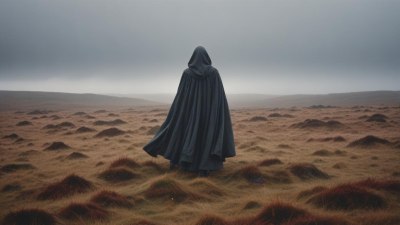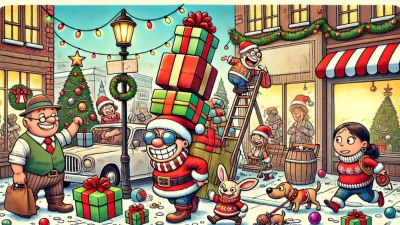The Laughing Dumpling (Fairy Tale)
Immerse yourself in the whimsical tale of Sanja, affectionately known as the "Laughing Dumpling," a cheerful old woman whose life revolves around perfecting her rice dumplings despite her modest means...
 Mary F. Nixon-Roulet
Mary F. Nixon-Roulet 
This image was created with the assistance of DALL·E
There was once an old woman who laughed at everything. She was a very old woman, but she seemed young. That was because she laughed so much, for the god of laughter made all the lines in her face pleasant lines.
She laughed at rain, she laughed at drought, she laughed at poverty. She had never had a chance to laugh at wealth, for she was very, very poor. She made rice dumplings to sell, and so she was called by the people about her the “Laughing Dumpling.” Her name was really Sanja.
Sanja had but one wish. She never prayed to Juro-Jin [1] for good fortune, or to any of the gods for wealth; but she wished above all things to make the finest rice dumplings in all the city. She tried and tried, and each time she made them better than the last; but she never made them quite perfect, and so she was never quite satisfied. She never had quite all the rice she wanted to work with; for she was so poor that each grain seemed to her as dear as a piece of money to a miser.
But still she tried and still she laughed. One day she sat in her kitchen making her dumplings with her usual care. Her little house stood at the top of a hill, quite outside of the city, and as she worked and patted with her paddle, one of the finest of her dumplings, it slipped and rolled right out of the door and down the hill.
“Dear, dear!” she cried, “that will never, never do! I can’t afford to lose that dumpling. Perhaps I can catch it.”
So she sprang up and ran after it as fast as her feet would carry her. But the dumpling had a good start, and she could not catch it. She saw it ahead of her, and suddenly it bounced down a hole in the ground. She ran after it, and before she knew it, her _geta_[2] slipped into the hole and she dropped through.
“A-a-a-i!” she cried, “where am I going?”
She did not stop falling until her breath was almost gone. Then suddenly she found herself in a place she had never seen before. The trees and flowers looked strange, and she felt a little frightened and very much alone. But as she looked about her her heart grew lighter, for she saw a statue of Jizu and him she well knew. So she bowed to him, and said, “Good morning, my Lord Jizu. Have you seen a rice dumpling fall this way?”
“Good morning,” answered Jizu, with his very sweet smile. “Yes, I saw a dumpling and it went past here, down the hill, skipping as if it had legs.”
“Oh, thank you very much, then I must skip after it,” said Sanja.
“Not so,” answered Jizu, “do not go down there. An _Oni_[3] lives there, and he may do you harm.”
“But I must have my dumpling,” laughed the old woman; and she ran on in the direction the dumpling had taken. She had gone only a little way when she came to another statue of Jizu. Being a good woman as well as polite, she bowed to it very reverently, and said, “My good Lord Jizu, have you seen a dumpling pass this way?”
“As if it had wings, it flew past me,” said Jizu, smiling upon her most sweetly.
“Then I must hurry to catch it,” said the old woman.
But Jizu shook his head, “You must not think of that,” he said, “there is an Oni below there who is most wicked. He does not like old women at all, and he will surely be cruel to you if he does not eat you.”
“But I must have my dumpling,” said Sanja. “He’ll not eat me. I’m too tough. Tee-hee-hee!” and she ran laughing on her way.
As she went along she thought she smelled her dumpling, and, as she was very hungry, it smelled very good.
“If I ever catch that dumpling I will certainly eat every bit of it,” she said to herself. “I will punish it for giving me such a chase. Tee-hee-hee!” Then she felt a shadow across her face. She looked up and saw another statue of Jizu.
“Most gracious Lord Jizu,” she said, smiling up into his ever smiling face, “have you seen my dumpling pass this way?”
“Yes, it passed but a moment ago,” he answered, “but do not think of searching for it, for the Oni who lives beyond is very fierce and cruel, and he will certainly eat you. He is fond of dumplings, but he is much fonder of human meat.”
“One who is as old as I am hasn’t any very fresh meat on her bones, tee-hee-hee!” laughed Sanja. But as she spoke, she heard a terrible noise and her face turned pale.
“Get behind me quickly,” said Jizu, “here comes the Oni. Perhaps you may escape him if you hide behind me.”
O Sanja San crept quickly behind him. She found herself not so brave as she had thought, and she did not feel at all like laughing. She hid herself very carefully behind Jizu, and up came the Oni, very wild and fierce.
“Good morning, Lord Jizu,” he said, “I smell meat!”
Even for the Oni, Jizu’s smile was the same, and he made answer, “Good morning, Oni. Is it not dumpling that you smell? I saw one pass this way not long ago.”
“No, indeed,” said the Oni, “it is not dumpling. I know one passed this way, for I saw it. What I smell now is human meat!” and he sniffed and sniffed until Sanja shivered. But for all her fear, she wanted very much to laugh.
“I don’t smell it,” said Jizu, still smiling. “Are you sure it is not rice dumpling? It seems to me that I smell a little of it about you.”
“That is not strange,” said the Oni with a grin; “for when I saw that juicy dumpling rolling my way I caught it and ate it. It was good. I wish I had the person who made it!”
O Sanja San was as angry as she could be at the thought of his eating her dumpling. She was frightened, too, and she cowered closer in the shadow of the Lord Jizu.
“What I smell now is meat, fresh human meat, juicy, young and tender!” and the Oni sniffed again and smacked his lips very impolitely.
This was too much for Sanja. She could not help thinking of her wrinkled, withered flesh, and how far from juicy, young and tender it was. She laughed out loud, “Tee-hee-hee. Tee-hee-hee!”
The Oni’s ears were as good as his nose, and without a word he stretched out a long, hairy arm behind Jizu, and pulled her forth from her hiding place. She was frightened terribly, but still she laughed.
“Who are you?” demanded the Oni.
“I am the woman who made the dumpling,” she answered. “Why did you eat it?”
“Because it was good,” said the Oni.
“You couldn’t eat me for that reason,” said Sanja.
“I don’t intend to eat you,” said the Oni. “You will come home with me and cook. You needn’t be afraid. As long as you cook good dumplings for me nothing will harm you.”
“Very well,” said Sanja politely, for there was really nothing else to say.
The Oni put her in a boat and rowed away across a river to his castle. There she cooked for him such dishes as he had never before tasted, and they were good.
But when she came to make rice dumplings, the Oni said to her, “You are a good cook, but you are wasteful. When you cook rice put but one grain into the pot.”
“One grain!” she cried. “Tee-hee-hee! how could any one live on one grain of rice?”
“I will show you,” said the Oni. “For though you are a woman and think you know much, there are some things which I know better than you.”
Sanja was silent; but she tossed her head a little, and said to herself, “How impolite he is! And how vain to think he could possibly know more than I do!”
“Be sure you have your water boiling,” said the Oni. “Put one grain of rice in the pot, then take this paddle in your hand and if you want rice for ten persons stir ten times, in this way;” and he stirred the paddle about in the water. “See!” and lo! the grain of rice burst into ten pieces, and each piece into ten more, and each a perfect grain, until the pot was filled.
Sanja fairly gasped with astonishment.
“This is a magic paddle,” said the Oni; “and with it you can cook every thing, serve every one, and always have enough.”
So Sanja stayed with the Oni and cooked for him, and she gave perfect satisfaction. The dumplings she made were always perfect, and the rice pot was never empty, because of the magic paddle.
All went very well until one day Sanja grew homesick. She felt as if she could not stay with the Oni another day, and as if she would die if she could not go home. She thought and thought about it; and the little hut with its paper walls, and the cherry tree beside it seemed fairer than all the fine castles of Oni Land. So, one day when the Oni had gone off for a day’s hunting, she decided to try to escape. She stole out of the castle and down to the river’s bank; and there she found the boat in which the Oni had brought her. Quickly she got into it and began to row. She had reached the middle of the river, when she heard a loud cry from the shore. There was the Oni with all his friends, waving their hands wildly and calling loudly to her, “Come back, Laughing Dumpling, come back!”
She was afraid to go on and still more afraid to go back. She began to row harder than ever when she saw what the Oni was doing. He and all his friends stooped down and, making cups of their hands, they began to drink the water of the river. They drank and drank, and soon there was so little water left to float the boat that they could wade to her across the river bed. She was so frightened that she could hardly think. As they came nearer, however, she thought how funny they looked, wading out from the reedy shore, and she laughed, “Tee-hee-hee!”
The Oni stopped and looked at her, “How strange that she laughs at everything!” said one.
She laughed again, “Tee-hee-hee!”
“She shall not laugh at me!” cried her master; and he started fiercely toward her.
The Laughing Dumpling was not going to be caught if she could help it, for she felt that this was now no laughing matter. Wondering what she could do to get away, she thought of the magic paddle which was tucked in her belt, where she had always carried it. She drew it forth, and reaching over the side of the boat she quickly stirred the waters. Then, lo! they began to flow again. They flowed so fast that they washed the boat right into the shore. They filled the river so quickly that the Oni had to swim for their lives.
Sanja ran quickly away, as fast as she could go, past the three statues of Jizu, up the hill and, with difficulty, up through the very hole into which she had fallen.
When she reached home she sat down quite exhausted; but as soon as she could get her breath she laughed until she cried.
“I ought not to have taken away the Oni’s paddle,” she said; “but he ate my dumpling, and made me cook all these months without any pay. Now I shall be able to make fine dumplings for all Kyoto. Tee-hee-hee!”
And so she did. For the magic paddle kept her always supplied with rice, and everybody came to eat of the wonderful rice cakes and to see the Laughing Dumpling.
[1] God of Good Fortune.
[2] Wooden sandal.
[3] A Japanese ogre.
This story is part of "Japanese Folk Stories and Fairy Tales" by Mary F. Nixon-Roulet. Read all the stories from this enchanting collection HERE!
✍✍✍
The story you've just experienced is a work of fiction, a creation of the imagination meant to entertain, provoke thought, and inspire. From the heart-fluttering highs of love stories to the spine-tingling chills of horror, these stories are unbound by the mundane. Whether you're in the mood for a quick escape or a deep dive into fantastical realms, explore the place where imagination echoes beyond the ordinary - Echoes of Imagination!
More fictional stories from from Echoes of Imagination 👇
The Daughter of a Samurai (Fairy Tale)
Between Dreams and Shadows: Lyra's Last Whisper (Fantasy Story)
The Boy and the Spirits of Things (Fairy Tale)
The Waterfall Which Flowed Saké (Fairy Tale)
The Coming of Benten Sama (Fairy Tale)
The Mountain Rose (Fairy Tale)
Beneath the Willow's Sigh: A Love Story Forged in Sacrifice (Fantasy Story)
Canvas Souls: The Painter's Secret (Horror Story)












